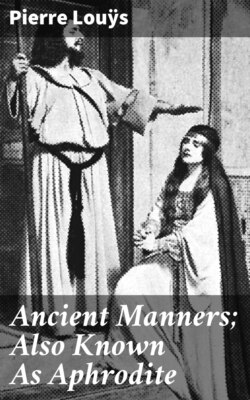Читать книгу Ancient Manners; Also Known As Aphrodite - Pierre Louys - Страница 8
На сайте Литреса книга снята с продажи.
IV
THE PASSER-BY
ОглавлениеTable of Contents
She carried slowly along the deserted quay, which was bathed in moonlight. Her head leaned over one shoulder. A little shadow danced and flickered before her footsteps.
Demetrios watched her as she drew near.
Diagonal folds intersected the little one saw of her body through the thin tissue; one of her elbows stood out in relief under the tight tunic, and the other arm, which she had left bare, carried the long train, holding it high out of the dust.
He recognised by her jewels that she was a courtesan. In order to avoid her salutation he crossed the road rapidly.
He did not want to look at her. He obstinately centered his thoughts upon the rough plan of his Zagreus. Nevertheless his eyes turned in the direction of the passer-by.
Then he saw that she did not stop, that she paid no attention to him, that she did not even affect to look at the sea, or to raise the front of her veil, or to absorb herself in her reflections; but that she was merely taking a walk by herself and was in search of nothing but the freshness of the breeze, solitude, abandonment, the subtle thrill of silence.
Demetrios did not take his eyes off her, and fell into a singular astonishment.
She continued to walk like a yellow shadow in the distance, nonchalant, and preceded by the little black shadow.
He heard at each step the slight creak of her shoe in the dust.
She walked on as far as the island of Pharos and went up into the rocks.
Suddenly, and as if he had loved this unknown woman for a long time, Demetrios ran after her, then stopped, retraced his steps, trembled, got angry with himself, tried to leave the quay; but he had never utilised his will except in the service of his pleasure, and when it was time to set it in motion for the salvation of his character and the ordering of his life, he felt completely powerless and nailed to the spot on which he stood.
As he could not throw off the thought of this woman, he tried to find excuses in his own eyes for the preoccupation which was so violently distracting him. He imagined that his admiration for the graceful apparition was due to a purely æsthetic sentiment, and he said to himself that she would make a perfect model for the Charis with the fan which he intended to design on the morrow.
Then, suddenly, all his thoughts became confused, and a crowd of anxious questions surged up into his mind about this woman in yellow.
What was she doing in the island at this hour of the night? Why, for whom had she left home so late? Why had she not addressed him? She had seen him, certainly she had seen him while he was crossing the quay. Why had she gone her way without a word of salutation? It was rumoured that certain women sometimes chose the fresh hours before the dawn to bathe in the sea. But there was no bathing at Pharos. The sea was too deep. Besides, how unlikely that a woman would be covered with all those jewels for no other object than to go bathing! Then what took her so far from Rhacotis? A rendezvous perhaps? Some young rake, avid of variety, who had chosen for a temporary bed the great rocks polished by the waves?
Demetrios wished to be certain. But the young woman was already returning, with the same calm and indolent step. The sluggish radiance of the moon shone full upon her face as she advanced, brushing the dust of the parapet with the end of her fan.
